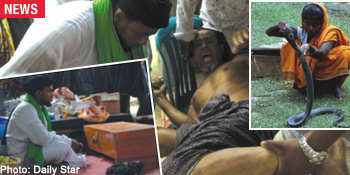- Joined
- Apr 9, 2009
- Messages
- 3,070
- Points
- 0

Iqbal Chisti would not stand out in a crowd. He is a mild-mannered, non-descript man who constantly chews paan while conversing in his local dialect. His panjabi, although expensive, hangs awkwardly on his lanky frame. Iqbal could be mistaken for anything from a shopkeeper to a farmer, but he has an unusual claim to fame. He is a faith healer adored by thousands.
Iqbal is a Pir or spiritual leader of the Chistiya order with a large following in the Sylhet region. Like other Pirs of his order scattered about the Indian subcontinent, he claims a spiritual connection with Khwaja Moinuddin Chisti, the famous Sufi saint of Ajmir.
Iqbal never received formal religious training, but says he inherited the Khilafah or mantle of spirituality from his father. "I try to help people as best as I can," he says. "I guide them, and try to cure their ills. But I am only the wasilah (medium)."
Iqbal's followers believe the Pir can " see" the spiritual world and recognises various diseases through mystical insight or with the help of his "pet spirits" (Jinn). He is capable of curing these diseases with his healing techniques.
According to Iqbal Chisti, the human body has nine latifah or spiritual points and healing can be achieved by paying special attention to these points. "This is the first and foremost one," says Chisti, laying his finger on a spot just above his heart.
Dr Khondoker Mokaddem Hossain, Professor of Sociology at Dhaka University, says the belief in the healing powers of holy men goes back to Vedic times. "Ayurveda or the 'science of life' was grounded in the metaphysical balance of the elements. The advent of Islam took spiritual healing to a new level. For the Sufis within the mystic branches of Islam, the healing of the sick is considered to be the most important of all services to humanity. Unfortunately, with time spirituality has been tainted by greed and materialism."
Every Thursday, after sunset, Iqbal goes to his village where he sits on a raised throne in the courtyard beside his great grandfather's tomb. There is much chanting, and burning of incense. The pir's followers give him their nazrana (gift) and seek his blessing.









